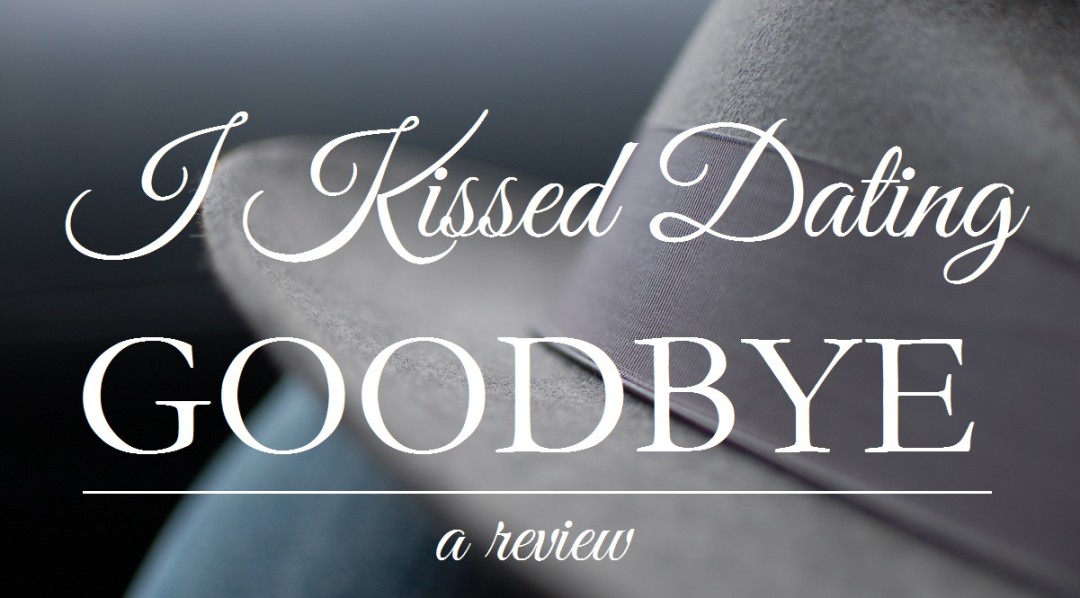“Ready for the Sack but Not for the Sacrifice” &
“What Matters at Fifty?”
We’re in the last section of I Kissed Dating Goodbye, titled “Looking Ahead,” and if you were tired of an unmarried, not-even-dating high school graduate lecturing you about your love life, then you’re just going to love this section because it’s about marriage. So, jumping right in with Joshua’s assertion that young people have an unrealistic view of what that is:
These people think of married life as one grand, thrilling moment after another– the everyday, mundane parts of marriage are safely edited from the picture. (166)
Le sigh.
I’ve only been married three years, but, so far, the “everyday, mundane” parts are the “thrilling” parts. Cooking while he loads the dishwasher. Watching TV or readings books out loud to each other. Going on walks. Making household decisions, like choosing which garbage pickup service we want. Maybe I won’t feel like this in ten years, but for now, the times when I’m the happiest, the most content, are those simple moments.
Also, do none of these “many young adults” have parents? I spent 20+ years watching my parents be married, and while I didn’t have an inside-out understanding of what being married is like, I certainly wasn’t expecting rainbows and unicorns. I love being married, 15/10 would recommend, but I knew going in that I, as a human being, was going to be living with another human being.
He then moves on to define “what marriage is,” relying on Love that Lasts by the Ricuccis (considering Carolyn Mahaney wrote the foreward, I think this is a book written by people at his church). He (and the Ricuccis) argue that “Marriage depicts the supernatural union between Jesus and the church” (168) which… yes. Marriage is one metaphor for that relationship in Scripture.
But so are grape vines, and architecture, and armies. The metaphor is a beautiful one, even powerful– something I understood better once I was married to a wonderful person– but it is just a metaphor. American Christian culture has idolized marriage, and one of the ways they’ve done it is through over-literalizing one metaphor among many. It was convenient for them to perpetuate a whole set of cultural conceptions and roles, so they took advantage of it.
The last few pages of this chapter turn into a dumpster fire, though:
As quickly as possible, we must dispel any selfish notions that marriage is about what we can get instead of what we can give. (171)
No, Joshua, it is about both. I “get” a patient, compassionate husband who carries me when I can’t walk, who helps me clean our home when I want to entertain even though he’d almost rather be a hermit, who says “let’s get takeout” when I don’t have the energy to cook. I give my love of research (on grills, washing machines, lawn mowers, cars…), my enthusiasm and hope, my willingness to handle all those grown-up calls we have to make to water companies and medical insurers.
People who aren’t “getting” anything while “giving” everything are in unstable, unbalanced, and unhealthy relationships. If you’re not “getting” anything from your life partner, it is a problem that needs to be addressed and corrected.
And then here’s the dumpster fire. Joshua is quoting from by Ann Landers, written in 1967:
…Marriage is giving– and more important, it’s forgiving.
And it is almost always the wife who must do these things.
Then, as if that were not enough, she must be willing to forget what she forgave… (171)
and this one by who he says was written by Lena Lathrop (it wasn’t; it’s by Mary Lathrap), penned before 1895:
…You require a cook for your mutton and beef,
I require a far greater thing;
A seamstress you’re wanting for socks and shirts–
I look for a man and a king … (173)
I have ugggghhhh scrawled over the margins here. Gender roles from the 60s and the Victorian era were all the rage in the culture I shared with Joshua, and it’s both hilarious and sad that he read the Lathrap poem and thought it was some kind of encouragement to young women to “keep their standards high” (174). These are just a few lines from the whole poems he quotes, but both place the tasks of drudgery and long-suffering on the women. Men get to be kings, get to have all their faults and foibles not only forgiven but forgotten, while women are perfectly content to be cooks and seamstresses if only their husbands are “kings.”
Just … ugh.
***
So far in I Kissed Dating Goodbye, it’s been obvious that Joshua has been trying to write something resembling gender parity. If he says something negative about women as a gender, he then attempts to say something disparaging about men as a gender. In my opinion the attempts fail because he can’t acknowledge the patriarchal system that is his bread and butter, but in chapter fourteen he just clear gives up:
When I meet a beautiful girl and I’m tempted to be overly impressed by her external features, I try to imagine what this girl will look like when she’s fifty years old … This girl may be young and pretty now, but what happens when the beauty fades? … When pregnancies and stretch marks and the years add extra pounds … (175-76)
This is nothing but misogyny, and it’s a point of view that’s reinforced by the Bible, which Joshua quotes from: “Charm is deceptive, and beauty is fleeting” (176).
Beauty is not fleeting; nor is it tied to youthfulness, thinness, or a lack of stretch marks. Not every person meets our white supremacist, misogynist society’s “standards” for beauty, but I know I’m not the only person who is capable of seeing beauty in every person, young or old, fat or thin. The way my mother-in-law’s eyes sparkle when she’s feeling mischievous. The delight that lights up my mother’s entire face until it feels like I’m looking at sunshine. The way my father’s face crinkles when he’s so proud of his children he could burst. The easy suppleness in the way my partner walks. The elegance in her hands when my sister-in-law is painting, the way my sister’s lips curl when she’s feeling especially fierce.
All of those are breathtakingly beautiful to me. Joshua’s view of “beauty” is so shallow and insipid it makes me sick.
The rest of the chapter is dedicated to laying out the qualities we should all look for in a mate. Because someone who thinks a fifty-year-old woman can’t be beautiful is definitely someone we should listen to about this. He places everything under two major headings, “character,” and “attitude,” and then chops those up into easily digestible bits.
How a Person Relates to God
Two brief things: first, people who aren’t Christians can have wonderful marriages. Secondly:
“It’s obvious when he really loves the Lord,” my friend Sarah said. “When he’s telling you about his love for God, you can tell he’s not distracted by you.” (178)
Bullshit. My ex could absolutely not shut up about how much he loved God, and how much he desired to serve God and become a missionary. Virtually everyone he knew would talk about how he was “on fire” for God until the cows came home. Didn’t stop him from being an abuser and a rapist. How a person “relates to God” is not something you can even begin to understand until you’ve been through life with them.
How a Person Relates to Others
The most important thing to note about this section is what he thinks is the most important and least important: how your potential significant other interacts with “the authorities” comes first, and whether or not they’re a jerk to their friends comes dead last (178-79). In his paragraph on “authorities” he makes it clear that a woman who “can’t respect a teacher’s authority will have difficulty honoring her husband.” I’ve had difficult respecting some teacher’s authority for a variety of reasons. They were bullies, or just incompetent. Just because someone is an authority doesn’t mean they automatically deserve respect. But, according to Joshua, exercising my judgment means I’m not good wifely material.
To me, the first thing that stood out to me about Handsome was that he’s empathetic. Truly understanding others is essential to his character; compassion and kindness are his first instincts in his relationships. Because I’ve gotten to know him, compassion is now a character trait I value in all my friendships. However, he has no regard for authority because they’re authority. He treats everyone with respect, but if you hurt someone it doesn’t matter to him what power you hold. This is one of the best and most wonderful things I love about him.
Personal Discipline
He spends almost two pages basically saying that we can’t be slutty (“flirtatious”) or get fat, and if we do, it’s a sign of bad character. Awesome.
An Attitude of Humility
He asks the men reading his book to observe how she “responds to conflict” in her family, and the only metric men need to use is whether or not we’re “humble enough to share blame” (182). This a tactic abusers use– the whole “it takes two to tango” idea, that it’s impossible for conflict to arise without more than one person contributing.
Often, that could be true. Most of the tense moments in my marriage come because we’re both doing something. But sometimes one person is grumpy and taking it out on the other, and there’s no equal share of blame to go around. The grumpy person needs to quit it. Sure, the other person can help by being sympathetic and understanding, but they are not to blame.
***
He finishes off the chapter by returning to “beauty,” this time emphasizing how “the spirit that lights up her sparkling eyes will still be young, vibrant, and alive” (186). It’s a rehashing of the tired trope that “beauty is more than skin deep,” but he’s still associating it with youth!
These were a couple frustrating chapters. But, good news, we’re almost done. I can’t wait to kiss this bloody book goodbye.



